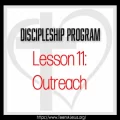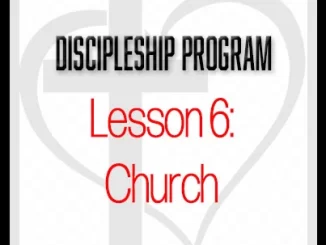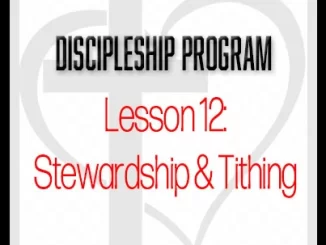We began this series of lessons with a verse, and with this final lesson we return to that same verse.
Matthew 28:19-20
Therefore go and make disciples of all nations, baptizing them in the name of the Father and of the Son and of the Holy Spirit, and teaching them to obey everything I have commanded you. And surely I am with you always, to the very end of the age.
As believers we are tasked with the responsibility of making disciples. Everything we have learned in the previous lessons that has helped us to grow in our own faith now serves as the basis for your next steps. You have been called to make disciples of all nations. Everything you have been working on in your own life is now going to be replicated in the life of another person or multiple people.
And it all begins with sharing the Gospel or the good news. This is called Evangelism and is the act of sharing the Gospel with others with the goal of helping them to embrace our faith and accept Jesus as their Savior. It involves presenting the message of Jesus, His death, His resurrection, and why this is important.
Romans 10:14-15 asks us important questions about those who have never heard the Gospel. It says, “How, then, can they call on the one they have not believed in? And how can they believe in the one of whom they have not heard? And how can they hear without someone preaching to them? And how can anyone preach unless they are sent? As it is written: ‘How beautiful are the feet of those who bring good news!’”
Sharing the Gospel is an act that every believer should be engaged in (2 Timothy 4:5). Even if you do not have a gift of evangelism, you are still called to share. We have all been commissioned by Christ to share. You don’t have to go on a mission trip to share. There are people in your neighborhood that need Jesus. It just takes you paying attention to the Spirit’s leading and being obedient to share.
The key to evangelism is sharing, not forcing them to act. We share, with a loving and respectful attitude, and let the Holy Spirit do the work in their hearts. We give them the invitation to act and don’t judge or pressure them in any way. Everything we say and do should be seasoned with a healthy dose of love. We are not there to impose our views and opinions on them, but rather to speak the truth in love (Ephesians 4:15).
Ways You Can Share
Here are a few ways that you can share the Gospel with others.
- Personal Testimony – No one can argue with a personal story of what you experienced. Sharing our story is an amazing way of helping people see the transformation in our own lives. But remember – sharing by itself is just witnessing, not evangelism. You need to be sure your testimony presents the Gospel and gives them an opportunity to act if you want it to be evangelism.
- Bible Studies/Small Groups – Invite people to attend your small groups and Bible Studies. People are more willing to attend smaller functions than they are to attend a church service.
- Service – Recall all those outreach events we covered a few lessons back? Those are great ways to share the Gospel with the community and to model Christian love in action.
- Social Media – Use social media for sharing. You can share your personal story, experiences you have, what your church is doing, or simply share the Gospel.
- One-on-one – Talking to people about their faith is a great way to engage them in conversation and either pray for them because they are already believers (and possibly invite them to your church) or to share the Gospel for the first time.
- Get creative and artsy – Make some creative pieces of art and share them with others.
Missions
Not everyone is called to go on mission trips or to become missionaries. But many churches offer the opportunity to go on a mission trip and to help spread the Gospel and serve.
A mission trip is a journey taken by a group (usually a church or a charitable organization) with the goal of serving and supporting communities in need. This is typically done in another country, though not always. The length of time one is on a mission trip varies. For some it can be a few days or a week, while others may be gone for a year or more. Trips are generally service-oriented – helping with construction, medical care, teaching English, offering activities or events, sharing meals with the homeless, etc.
It is important to know that though we have a goal of sharing Jesus with others through our words and actions, not everyone is ready to accept Christ. Just remember, seeds are being planted. The key is to love everyone regardless of whether they are receptive to the Gospel or not. A mission trip teaches you how to be selfless and to care for others.
Those of us who are not called to be full time missionaries go on short-term missions. These opportunities allow us to experience other cultures while serving the people of that region and sharing the Gospel. It can be a life-altering experience as well as humbling.
A mission trip usually contains a few key elements.
- Evangelism – Part of the trip should have the goal of sharing the message of salvation and Jesus. It should be presented in a direct, straightforward manner, focusing on Christ’s love and gift of salvation through repentance and dedicating one’s life to Him.
- Service – Most teams look for ways to provide humanitarian aid or the means to making improvements to their way of life. This includes building homes, construction projects, cleaning, painting, providing medical aid, teaching English, providing food, serving meals, holding services and events, etc.
- Long-term care – There should always be some long-term care element for missions. It would do no good to go into a community, lead people to Christ, then leave them with no follow up. There should always be a partner organization, whether a local church or missionaries, who can continue working with the people you have helped.
Preparing for a Mission Trip
Mission trips involve a lot of planning and preparation. The process varies from church to church or organization, but some of the same elements can be expected from all. These include, but are not limited to, the following:
- Objectives – The goals and objectives of the trip need to be determined and communicated with all team members.
- Team Recruitment – Potential team members need to be committed to the mission goals and objectives and prepared for the trip. You want to ensure you have enough team members participating to ensure success on your trip.
- Training – Every member of your team needs to understand the culture, the language, and safety protocols, as well as be committed to and understand the objectives.
- Fundraising – It takes money to pay for a mission trip. This covers travel expenses, accommodations, food and supplies. Fundraising may be available from your church or organization, but you’ll also want to ask others to help invest in your trip to ensure you have money to allow you to participate.
- Logistical Planning – It is very important to have all the details organized and ready to go before embarking. This includes transportation, reservations, contracts, accommodations, schedules, passports and visas, permits, and immunization records.
- Health & Safety – People need to be aware of health risks and precautions before going on a mission trip. Some additional immunizations might be necessary for certain regions. Medications you need should be readily available, and complete medical records made available to the team should an emergency arise while abroad.
- Cultural Sensitivity – Your church or organization should provide guidance on cultural norms and customs, but you need to understand these before going. This includes appropriate attire, communication styles, food and diet, and respect for local traditions and customs.
- Spiritual Preparation – All team members should be engaging in activities that will help support the mission. This includes prayer, Bible study, reflection on the purpose, and planning to share.
Study Questions
- What is the difference between outreach, missions, and evangelism?
- Which method of sharing do you think would be most effective for evangelizing?
- Why do you need to prepare personally for a mission trip? How do you think it might affect the team if you were not prepared spiritually?
Think About It
Spend some time thinking about your personal story of how you came to Christ and the changes in your life. Write out your testimony. It doesn’t have to be long or show extreme change. Just be honest with yourself and write out what changes you have gone through since accepting Christ.
Discipleship Program Index | Lesson 12 | Glossary








Be the first to comment